I set up a simple MDP for a board that has 4 possible states and 4 possible actions. The board and reward setup looks as follows:
Here S4 is the goal state and S2 is the absorbing state. I have defined the transition probability matrices and reward matrice in the code that I wrote to get the optimal value function for this MDP. But as I run the code, I get an error that says: OverflowError: cannot convert float infinity to integer. I could not understand the reason for this.
import mdptoolbox
import numpy as np
transitions = np.array([
# action 1 (Right)
[
[0.1, 0.7, 0.1, 0.1],
[0.3, 0.3, 0.3, 0.1],
[0.1, 0.2, 0.2, 0.5],
[0.1, 0.1, 0.1, 0.7]
],
# action 2 (Down)
[
[0.1, 0.4, 0.4, 0.1],
[0.3, 0.3, 0.3, 0.1],
[0.4, 0.1, 0.4, 0.1],
[0.1, 0.1, 0.1, 0.7]
],
# action 3 (Left)
[
[0.4, 0.3, 0.2, 0.1],
[0.2, 0.2, 0.4, 0.2],
[0.5, 0.1, 0.3, 0.1],
[0.1, 0.1, 0.1, 0.7]
],
# action 4 (Top)
[
[0.1, 0.4, 0.4, 0.1],
[0.3, 0.3, 0.3, 0.1],
[0.4, 0.1, 0.4, 0.1],
[0.1, 0.1, 0.1, 0.7]
]
])
rewards = np.array([
[-1, -100, -1, 1],
[-1, -100, -1, 1],
[-1, -100, -1, 1],
[1, 1, 1, 1]
])
vi = mdptoolbox.mdp.ValueIteration(transitions, rewards, discount=0.5)
vi.setVerbose()
vi.run()
print("Value function:")
print(vi.V)
print("Policy function")
print(vi.policy)
If I change the value of discount to 1 from 0.5, it works fine. What could be the reason for the value iteration not working with discount value 0.5 or any other decimal values?
Update: It looks like there is some issue with my reward matrix. I have not able to write it as I intended it to be. Because if I change some values in the reward matrix, the error disappears.
